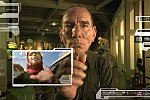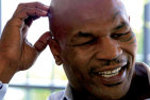 Shadows off the beaten path
Shadows off the beaten pathNOT QUITE HOLLYWOOD | TYSON
< < D O C S > >
last update 24.Mar.09
See also: SHADOWS FILM FESTIVAL
 R E V I E W B Y R I C H C L I N E
R E V I E W B Y R I C H C L I N E
with Pete Postlethwaite, Alvin Duvernay, Jeh Wadia, Layefa Malemi, Jamila Bayyoud, Piers Guy, Fernand Pareau, Mark Lynas
 release UK 20.Mar.09
release UK 20.Mar.0908/UK 1h25
 With a fresh approach, this documentary combines a series of global warming-related stories with a linking device that's both clever and gimmicky. But it also proves the difficulty of making a film on this important topic that's not depressing.
With a fresh approach, this documentary combines a series of global warming-related stories with a linking device that's both clever and gimmicky. But it also proves the difficulty of making a film on this important topic that's not depressing.
In 2055, the remnants of humanity are being preserved by an archivist (Postlethwaite) who looks back at the events leading up to the global climate tipping point 40 years earlier. He shows us six stories: a Mumbai businessman (Wadia) is setting up India's first low-cost airline; a British developer (Guy) battles protesters to install a wind farm; a New Orleans oil company scientist (Duvernay) rescues people after Hurricane Katrina; a Nigerian medical student (Malemi) struggles against oil company pollution; an 82-year-old French mountain guide (Pareau) watches as an Alpine glacier melts away; and an 8-year-old Iraqi girl (Bayyoud) yearns for her brother to join her as a refugee in Jordan.
Each of these stories is lively and fascinating, and filmmaker Armstrong includes current news footage, clever effects work, terrific animated segments and a wealth of information that's often quite scary. The key question is why we're not stopping climate change while we still can. Individually, none of the stories seem particularly devastating, but by intercutting between them, the cumulative effect highlights our individual responsibility to take care of the planet and do what we can.
On the other hand, as with other climate change docs (including Al Gore's more entertaining An Inconvenient Truth), the ultimate feeling is one of helplessness. While we can make key individual choices, it's the world's leaders who must push for significant changes. And we know that's not likely to happen in a world where oil is such a key player both economically and politically.
The oil companies are the villains in this film, with evidence of greed and injustice that's often overpowering. Oil profits rarely benefit residents of the countries where it's found, and lobbyists make sure alternative energy sources can never find equal footing. But the filmmakers also go after consumer culture, in which we throw out anything we're tired of and believe the capitalism myth that economic growth can continue forever. It's this attitude that has made us afraid of taking direct action to find a balance of equity and sustainability. And that's pretty stupid.
16.Dec.08
 R E V I E W B Y R I C H C L I N E
R E V I E W B Y R I C H C L I N E
with Nhamo Shire, Mike Martin, Pierre Henry Fontaine

release UK Oct.08 rff
08/UK 1h30

 It's about time someone made a documentary about UK basketball, a hugely popular sport that gets no media coverage at all. And this intriguing film highlights an especially important basketball movement.
It's about time someone made a documentary about UK basketball, a hugely popular sport that gets no media coverage at all. And this intriguing film highlights an especially important basketball movement.
Nhamo Shire started Midnight Madness in 1999 to give young men in northwest London something to do besides falling into gun crime. Events run through the night, and now are held around the country. The film follows the 2007 season, with regional competitions to select the 10 stars who will represent Britain against a team in Los Angeles, giving these British player exposure to NBA scouts. The film follows Shire through the year, along with top players Martin and Fontaine.
Filmmaker Belleville assembled this from some 400 hours of home-movie style footage, plus new interviews shot in a more colourfully cinematic style. The result is lively and engaging, as it sticks to the chronological narrative and follows Shire and the players on their odyssey, with small sideroads for a daughter's birthday party, a picnic in the park and some California tourism.
Intriguingly, the film focuses less on the basketball than on the players' internal journeys. The only voices we hear are the participants themselves, interviewed on camera as on-screen titles give us the essential background information (as well as some corny hyperbole about how life-changing this is). Meanwhile, the fascinating sound mix combines several styles of music, from indie hip-hop to smooth jazz and even classical, which gives the often slo-mo basketball clips a sense of balletic artistry. Although this is extremely muscly ballet.
The three central figures are terrific movie characters, with their distinct personalities and astute observations, as well as strongly individualistic senses of humour in more off-handed moments that are dotted throughout the film. Besides being engaging and entertaining, this film has a quietly powerful message about a tournament that truly gives hope to people who need it, and offers them a chance to play at the top of their sport.
And in Shire, the film finds a real hero: a man who has given his whole life to creating something powerfully positive for British communities. At one point he remembers the day that he discovered that his first name means "adversity", which he thinks is probably appropriate, since he faces adversity every step of the way. But he never gives up.
12.Oct.08 rff
 R E V I E W B Y R I C H C L I N E
R E V I E W B Y R I C H C L I N E
with Quentin Tarantino, George Miller, Brian Trenchard-Smith, Barry Humphries, Dennis Hopper, Jamie Lee Curtis, Stacy Keach, George Lazenby, Jack Thompson, Wendy Hughes, John Jarratt, Susannah York, Fred Schepisi, Ted Kotcheff, Richard Franklin, Russell Mulcahy
 release Aus 28.Aug.08,
release Aus 28.Aug.08, UK 13.Mar.09, US 31.Jul.09
08/Australia 1h43
TORONTO FILM FEST

 This raucously entertaining documentary takes a trawl through nearly 40 years of Australian exploitation movies. With a wealth of digitally restored clips and lively interviews, filmmaker Hartley definitely makes a case for a style of film that has changed the world.
This raucously entertaining documentary takes a trawl through nearly 40 years of Australian exploitation movies. With a wealth of digitally restored clips and lively interviews, filmmaker Hartley definitely makes a case for a style of film that has changed the world.
As Australian cinema was being noticed globally for prestige films like My Brilliant Career and Breaker Morant, another group of filmmakers was flooding the domestic market with fast and cheap crowd-pleaser movies centred on ockers (aka slackers) or bikers with over-the-top vulgarity, violence and sex. Often these films featured has-been American actors (like Keach and Curtis in Roadkill, or Hopper in Mad Dog Morgan). And they were hated by the censors as well as the keepers of Australia's cinematic image. But fans loved them, and the movement led to such groundbreaking work as Mad Max and Wolf Creek.
This film is assembled from an astonishing collection of interviews with virtually everyone who has touched the genre: actors, directors and stunt men, plus those who were inspired by them, such as Tarantino, Jamie Blanks (Urban Legend), James Wan and Leigh Whannell (Saw). And every comment is illustrated with a hysterical clip from one of the films, which are often so outrageous that it's hard to believe they're real movies.
In other words, this doc is also a celebration of raw, grass-roots creativity at a unique place and time in cinema history. And it's fascinating to watch how the movement shifts and changes as success goes to the filmmakers' heads and they start making bigger and more expensive films, only to be crushed by the arrival of home video, which completely changed the exploitation movie and killed off the drive-ins where it flourished.
Even as a documentary, this is one of the most audacious and energetic films of the year, assembled with style and artistic flourish and capturing the exuberance of the interviewees, as well as the boisterous, rude humour of the movies themselves. It'll also send you looking for these movies on DVD, ensuring that they are forever remembered as an important part of film history.
28.Oct.08 lff
 R E V I E W B Y R I C H C L I N E
R E V I E W B Y R I C H C L I N E
with Mike Tyson
 release UK 27.Mar.09;
release UK 27.Mar.09;US 24.Apr.09
08/US 1h30
CANNES FILM FEST

SUNDANCE FILM FEST
 For a documentary, this film isn't remotely balanced, telling the story only through the eyes of the boxer himself, along with historical footage. But it's so expertly assembled that it's absolutely riveting.
For a documentary, this film isn't remotely balanced, telling the story only through the eyes of the boxer himself, along with historical footage. But it's so expertly assembled that it's absolutely riveting.
In his hilltop Los Angeles mansion, Tyson reminisces about his life, from his difficult childhood in Brooklyn to his discovery of boxing while in juvenile detention and the discipline it brought. But that was eroded by the obscene amount of money he made as one of the most successful boxers of all time. Obsessions with sex, drugs and living the high life took a toll on him and those around him as he goes through two marriages, a rape conviction, prison time and that notorious ear-biting incident.
Seeing this takes us behind the headlines in unexpected ways. We don't get any dissenting opinions; this is Mike's story from Mike's point of view, which is filmmaker Toback's whole point. All of these extremely familiar events are recounted from a strikingly different perspective. And whether or not we believe him, there's no denying that, throughout his life, he's been racked with crippling paranoia and self-doubt. He's also remarkably realistic about his own failings ("I'm a jerk, but I'd never do that," he says of the rape charge). As a result, we develop a reluctant sympathy for him, watching his ability to trust other people dissolve through a series of betrayals.
Toback assembles this expertly, merging old photos and interview footage with familiar news clips. It's edited together in a swirling, visually inventive multi-screen style that sharply builds momentum. Emotions and moods collide to take us deep under Tyson's surface bravado. We see his brute strength, both physical and psychological, as well as the way he fights his own fears through sheer force of will. And Toback captures some remarkably intimate moments.
Tyson opens up so much on camera that we can almost see right through him, both in the way he examines the mistakes and successes of his past and in his tortured recollections of how he lost faith in both people and God along the way. Without offering screen time to the likes of Givens or his nemesis Evander Holyfield, this film can't possibly be the final word on Tyson. But as the portrait of a man who has lived an extraordinary life, it's pretty unmissable.
13.Oct.08 lff


See also: SHADOWS FILM FESTIVAL
© 2009 by Rich Cline, Shadows
on the Wall